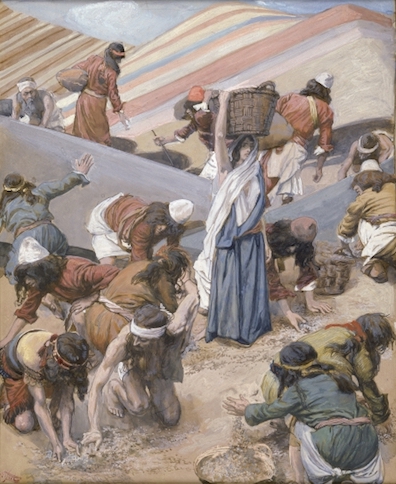Both Stephen and Bloom think of a biblical phrase, "fleshpots
of Egypt," that evokes life in exile. It is used by the
Israelites when they rebel against Moses, who has led them out
of captivity in Egypt into near-starvation in the Sinai
desert.
In "the fifteenth day of the second month" after leaving
Egypt, "the whole congregation of the children of Israel
murmured against Moses and Aaron in the wilderness: And the
children of Israel said unto them, Would to God we had died by
the hand of the Lord in the land of Egypt, when we
sat by the flesh pots, and when we did eat bread to
the full; for ye have brought us forth into this wilderness,
to kill this whole assembly with hunger" (Exodus
16:1-3). Yahweh responds by promising to "rain bread from
heaven" (16:4), "And it came to pass, that at even the quails
came up, and covered the camp: and in the morning the dew lay
round about the host" (16:13). The quail meat and the manna
rescue the people from starvation.
Stephen apparently thinks of this episode in Proteus with
a wry, sardonic twist. He has escaped from Ireland, only to
face near-starvation in Paris. What does he find to eat there?
Not elegant quail or miraculous manna but only "fleshpots"
of the lowest order: "mou en
civet" is lung stew.
Bloom too does something surprising with the image. He thinks
of a man named Jack Fleming who ran off to America and "Keeps
a hotel now. They never come back. Fleshpots of
Egypt." In this instance, the better economic
circumstances in America, imaged as fleshpots, keep Ireland's
exiles from returning. Material fulfillment wins out over
spiritual calling.
